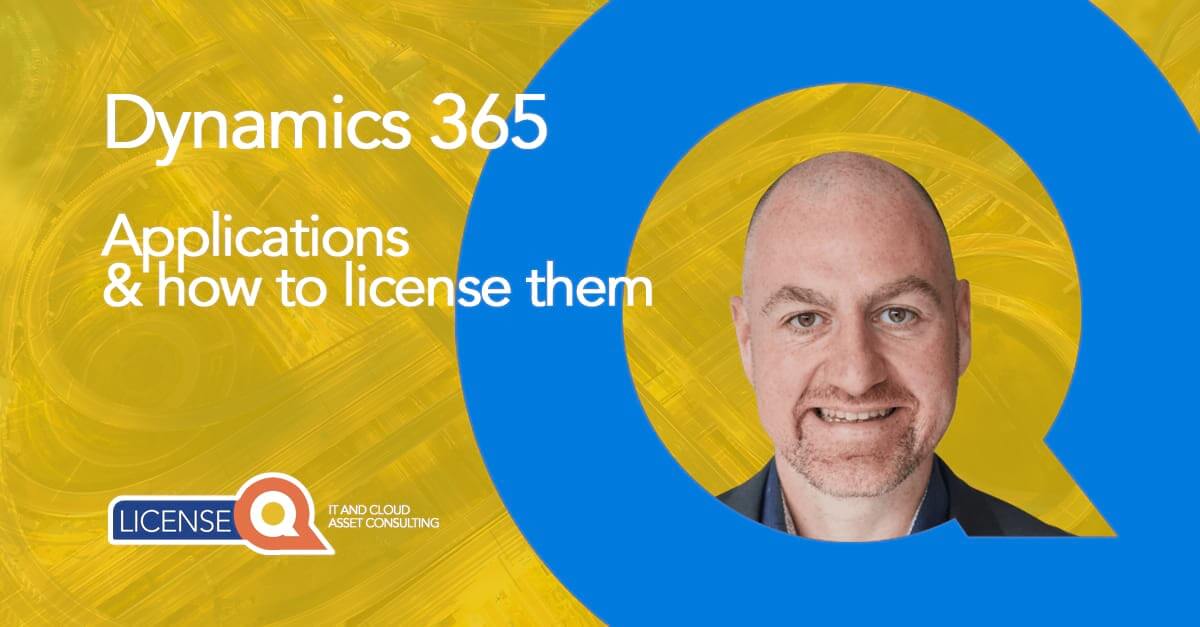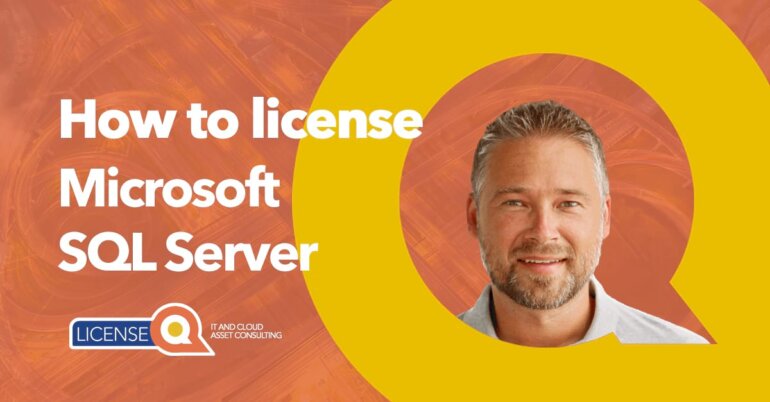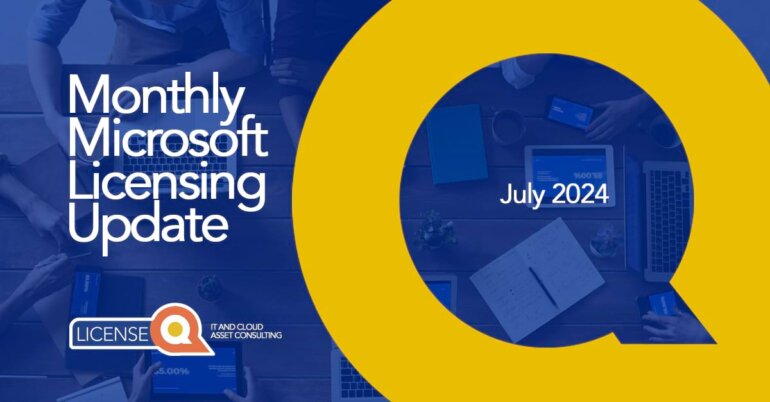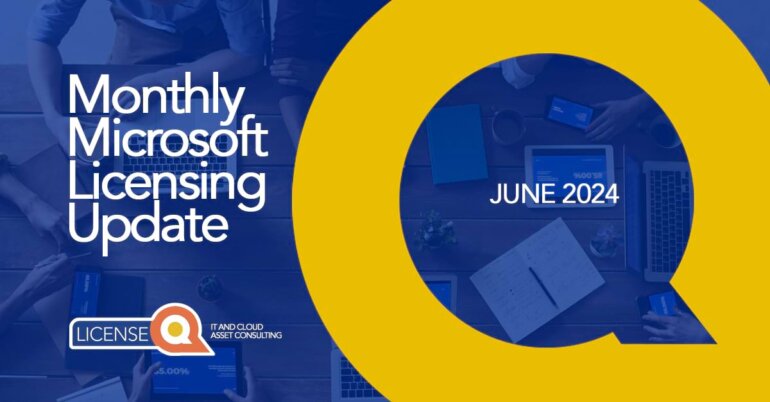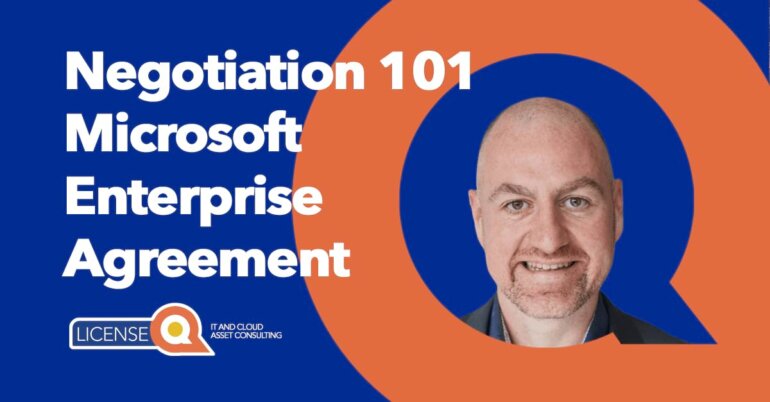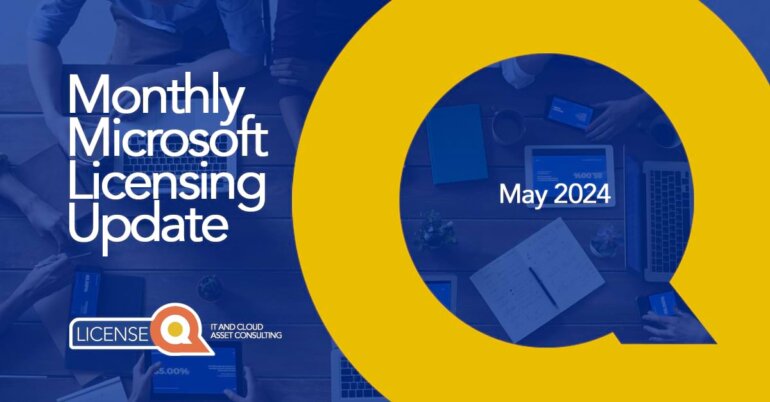Dynamics 365 apps & licensing explained
1. Map of Dynamics 365
Dynamics 365 is a suite of intelligent business applications developed by Microsoft that cover various aspects of customer relationship management (CRM) and enterprise resource planning (ERP). Each application is designed to cater to specific business needs and can be licensed individually or as a bundle, depending on your organization’s requirements.
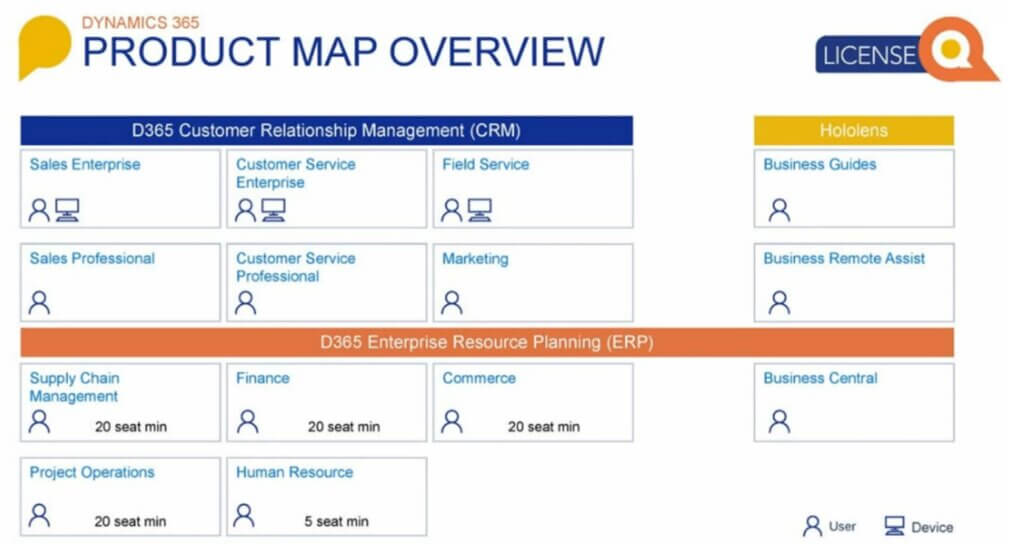
2. D365 Customer Relationship Management (CRM) apps
The Dynamics 365 apps for Customer Relationship Management aim to optimize business interactions with customers by centralizing data, automating processes, and providing actionable insights to improve customer engagement and drive growth.
The D365 CRM apps are:
- Dynamics 365 Sales Enterprise/Professional
- Dynamics 365 Customer Service Enterprise/Professional
- Dynamics 365 Field Service
- Dynamics 365 Marketing
- Dynamics 365 Customer Service Insights
1. Dynamics 365 Sales Enterprise & Dynamics 365 Sales Professional
This application helps sales teams manage leads, opportunities, and customer relationships. It includes features for tracking sales activities, managing contacts, and analyzing sales performance. Microsoft states that the Sales application accelerates revenue with an insight-based collaborative Sales Engagement Solution. The D365 Sales app is available in different user licenses, namely:- Enterprise
- Professional
- Premium
- Microsoft Relationship Sales (MSR)
What are the different options?
D365 Sales Professional license provides essential sales force automation to your organization without having to dive into complex sales processes. It is the most basic functionality that Microsoft provides for sales. D365 Sales Enterprise goes further to meet the needs of more complex sales processes. On top of the functionality available in Professional, it also offers customization, extensibility, mutual forecasting and more. Enterprise also includes the 2000 customer voice responses per tenant. Note! You also get this with Field Service and these two products total up together. D365 Sales Premium is intended for those Microsoft customers that need to combine both Sales Enterprise and Sales Insights. D365 Microsoft Relationship Sales (MSR) is a bit confusing. MSR helps build relationships that Sales Representatives can leverage to optimize the power of relationships selling. It is a Sales Enterprise license and it includes a LinkedIn Sales Navigator Enterprise. MRS is licensed per user and has a minimum requirement of 10 licenses.Additional add-ons
There are additional add-ons available for the Sales app, such as Sales Insights, which you can buy separately if you have Sales Enterprise and add-on to move on to Sales Premium. For more detailed information on the D365 Sales App, visit the Dynamics 365 Sales app page.
2. Dynamics 365 Customer Service Enterprise & Professional
This application focuses on delivering excellent customer service experiences. It includes tools for case management, knowledge base creation and omnichannel customer engagement.
The Customer Service app helps you manage your customer relationships, empower your customer service agents and provide a branded personalized self-service experience through a searchable knowledge base that delivers consistent up to date answers.
Professional or Enterprise
Licenses in Dynamics 365 are available as either a Professional or an Enterprise user license, however you cannot mix the two in one environment. You can have them in different environments or in a different tenant, but you cannot have these licenses together in the same environment.
This means that if you need Customer Service Professional Licenses for some of your users and Customer Service Enterprise Licenses for others, you need to cover them in different environments entirely.
Differences between Pro & Enterprise
Enterprise is available as a device-based license. A device-based license is ideal if you have many users using one single device. It makes more sense to license the device for Customer Service Enterprise than each individual user.
As the image below shows, there are a lot of features in Customer Service Enterprise that you do not get in Professional, such as: Unified Service Desk, Embedded Intelligence, Context-driven Suggestions and more.
Additional add-ons
There are also a lot of add-ons and features that you can buy on top of the standard access for Customer Service Professional.
In Customer Service Enterprise the following are available:
- Chat
- Digital Messaging
- Customer Service Insights
- Voice Channel
- Digital Messaging and Voice Channel
In Customer Service Professional you can buy additional capacity for:
- Unified Routing
- Intelligent Voice Bot
- Call Intelligence Minutes
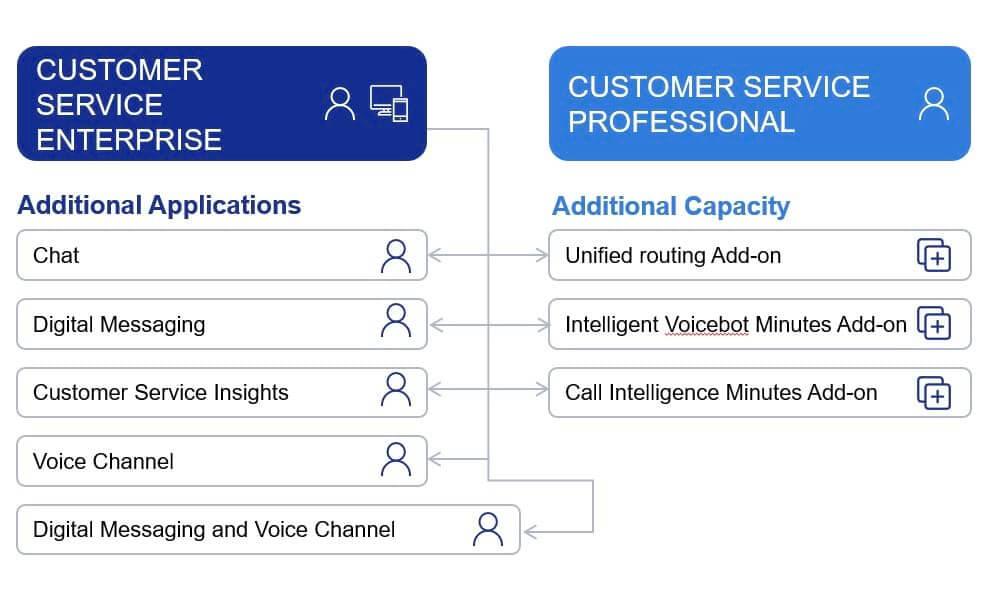
3. Dynamics 365 Field Service
This application is targeted at organizations that provide field services, such as maintenance, repair, and installation. It helps optimize scheduling, dispatching, and resource allocation.
Field Service connects and empowers field-based service teams. It leverages tight integration between Customer Service Case Management capabilities and Field Service work orders to deliver business process driven best in class management of your field service operations.
Microsoft often leverages their case study with ThyssenKrupp to market Field Service. ThyssenKrupp builds elevators and they use Field Service in their day-to-day operations to ensure every employee can log in to update the system with any changes they make to any of their elevators.
Field Service works in real time. You can check out some great videos on the Dynamics website.
How to license Field Service
Field Service is available per user or per device. A per-user license grants you Field Service Mobile. This is not the same as a Dynamics 365 Mobile Client, but actually goes a lot further as Dynamics 365 Mobile Client was not providing workers what they needed in the field.
Field Service Mobile grants you 2000 customer voice responses per tenant per month on top of the add-ons to Field Service.
4. Dynamics 365 Marketing
D365 Marketing is an automation application that enables marketers to plan, execute, and analyze marketing campaigns. It includes features for email marketing, lead nurturing, segmentation, and analytics.
Key features of D365 Marketing
Some of the key features of Dynamics 365 Marketing:
- Customer Insights – Marketing teams can segment audiences based on behavior, preferences and previous interactions with the brand. These insights can be utilized to tailor marketing strategies and make them more effective.
- Multi-Channel Campaigns – Plan and execute campaigns using email, social media, web landing pages, text messages and more. You can automate the customer journey to ensure that prospects and customers receive the right content at the right time.
- Email Marketing – A core functionality is robust email marketing. Users can design emails using drag-and-drop editors, test them and then monitor performance through various metrics like open rate, click-through rate, etc.
- Event Management – Allows companies to manage webinars, in-person events and other kinds of events from start to finish, including registration, feedback, and post-event analytics.
- Lead Scoring – Score leads based on how they interact with your campaigns, allowing your sales team to focus on high-quality prospects who are more likely to convert. You can customize the criteria for lead scoring to fit your unique business needs.
- Integration – Seamless integration with other Microsoft products like Dynamics 365 Sales, Microsoft Teams and Power BI. This makes it easier to collaborate across different departments and gain a unified view of your customers.
- GDPR and Compliance tools – Help ensure your marketing efforts are in compliance with regulations like the General Data Protection Regulation (GDPR).
- Analytics and Reporting – Comprehensive analytics and customizable dashboards that help you track the performance of your campaigns and make data-driven decisions.
How to license D365 Marketing
Dynamis 365 Marketing is as a single-application license. This means you only have to buy the application once. Unlike other applications, it is not a per user or per device license. You can buy this standalone or as an attach license (on top of any of the earlier mentioned applications).
The application allows you 10,000 contacts, 100,000 interactions and 1,000 SMS messages. If you need more than this, you can add additional capacity to get additional contacts and interactions. One license allows you to use the Marketing application in one environment. If you require the Marketing app in multiple environments, you need to purchase additional instances!
Please note that as of September 1st, 2023, Dynamics marketing will be included in Dynamics 365 Customer Insights to become the default Dynamics 365 Customer Insights SKU. It will be sold as Dynamics 365 Customer Insights – Journey and Dynamics 365 Customer Insights – Data applications.
5. Customer Insights
Dynamics 365 Customer Insights is not to be confused with Customer Service Insights!
Customer Insights is a cloud-based service designed to help customers unify and understand customer data from various sources and to harness it for intelligent insights and actions.
The primary goal is to provide a comprehensive view of each customer by unifying all the data you have about them—be it from sales, customer service or other touchpoints—into a single profile. This enables businesses to understand their customers better and to provide more targeted and personalized services or products.
Customer Insights capacities are based on profiles and accounts—unique customers identified by combining source data sets from multiple applications. Customer Insights licenses also grant capacities for data scheduled refreshes and environments. Buying add-on capacity does not increase the allotment of segments, KPIs, or allowed data scheduled refreshes.
How to license Customer Insights
Customer Insights is licensed per tenant, which means that the licensing cost covers your entire organization, rather than individual users or departments.
If you have at least 20 full users of Sales Enterprise or Customer Service Enterprise or a Marketing application tenant license, you are eligible for the Customer Insights attach pricing. For more information on Dynamics 365 licensing pre-requisites see the Product Terms.
Please note that as of September 1st, 2023, the Dynamics 365 Marketing application has been integrated into Dynamics 365 Customer Insights. If you currently subscribe to either of these, you can extend this in your renewal until September 1st, 2024. From September 1st, 2027, you need to move to the new Dynamics 365 Customer Insights motion (which will include Dynamics 365 Marketing). If you want to know more, watch the video below!
Key features Customer Insights
Data Unification – Breaks down data silos. In many organizations, customer data is stored in multiple locations (CRM systems, databases, spreadsheets, etc). Customer Insights helps unify this data into a single customer profile, making it easier for businesses to gain a 360-degree view of their customers.
Integration with Dynamics 365 Products – View these unified customer profiles from within other Dynamics 365 products like Sales, Customer Service, or Marketing. This integrated approach improves efficiency and allows for better data utilization across the organization.
Capacities Based on Profiles and Accounts – The term “capacities” here refers to the system limitations on the number of unique customer profiles and accounts that can be managed. These unique profiles are created by combining data sets from various applications, thereby providing a more complete view of each customer.
Data Scheduled Refreshes and Environments – The license also covers certain capacities for refreshing your data at scheduled intervals and for different data environments. This is crucial for keeping the customer data up-to-date and accurate.
Add-On Capacity – It’s worth noting that buying additional capacity will not increase certain limits like the number of segments or KPIs (Key Performance Indicators), or the frequency of data scheduled refreshes.
Eligibility for Attach Pricing – For organizations already invested in Dynamics 365—specifically with at least 20 full users of Sales Enterprise, Customer Service Enterprise, or a Marketing application—you can benefit from what’s called “attach pricing” for Customer Insights. This presumably offers some cost benefits, though the specifics would be detailed in the Product Terms.
3. D365 Enterprise Resource Planning (ERP) apps
For Dynamics 365 ERP apps there is a minimum requirement of 20 licenses. In the past you could combine these over the finance, commerce, supply chain or the project operations application, however this was removed as of August 2023 (see licensing update). The result is that you now need to have at least 20 licenses for any specific application you want to use.
The D365 Enterprise Resource Planning apps are:
1.Dynamics 365 Commerce
This application supports e-commerce and retail operations, including online sales, in-store operations, and customer engagement. It aims to help retailers manage operations and multiple stores, connect employees with data and offer better shopping experiences.
Although the Commerce app is not for everyone, it can be ideal for employees at the HQ and central operations of a retail organization.
If you have employees working in stores you can assign them an Operation Activity License or an Operations per-device license, rather than a complete Commerce license. It is the base layer to manage and streamline your stores.
Optional add-ons
E-commerce
The Commerce app has lots of optional add-ons, such as e-commerce which will help you set up your online shop. E-commerce needs to be procured tenant-wide and has the Commerce Scale Unit included. You can also buy the Commerce Scale Unit separately.
E-commerce keeps track of your online transactions. A transaction is defined as the final purchase of all items in an e-commerce shopping cart. If a customer fills up their shopping cart and purchases 20 items in one go, that is seen as one e-commerce transaction.
For e-commerce, you buy the tier you need for the amount of transactions for your organization. There is an option to purchase additional capacity these e-commerce tiers as well. Additionally, you can add Operations licenses for your devices.
Commerce Scale Unit
In combination with e-commerce, Commerce Scale Unit allows you to execute business processes without interruption during periods of peak-demand, like Christmas. Commerce Scale Unit enables you to ramp up the capacity of your tenant quickly and ensure smooth operations. You can assign the Commerce Scale Unit to your stores and it offers different types that allow you to scale on different levels. If your organization is focused on call centres, you might need additional Operations Activity licenses.
Commerce Recommendations
Commerce Recommendations is also available tenant wide. It helps your customers and you find products you want quickly and easily.
Ratings & Review
This add-on helps you capture product reviews.
The below image shows an overview with details on how the Commerce app works and shows what happens when you add additional add-ons like the e-commerce, what you can buy in the app and what license types you can assign.
This is a very complex topic. Do reach out to us if you have any further questions at info@licenseq.com and one of our experts will get back to you.
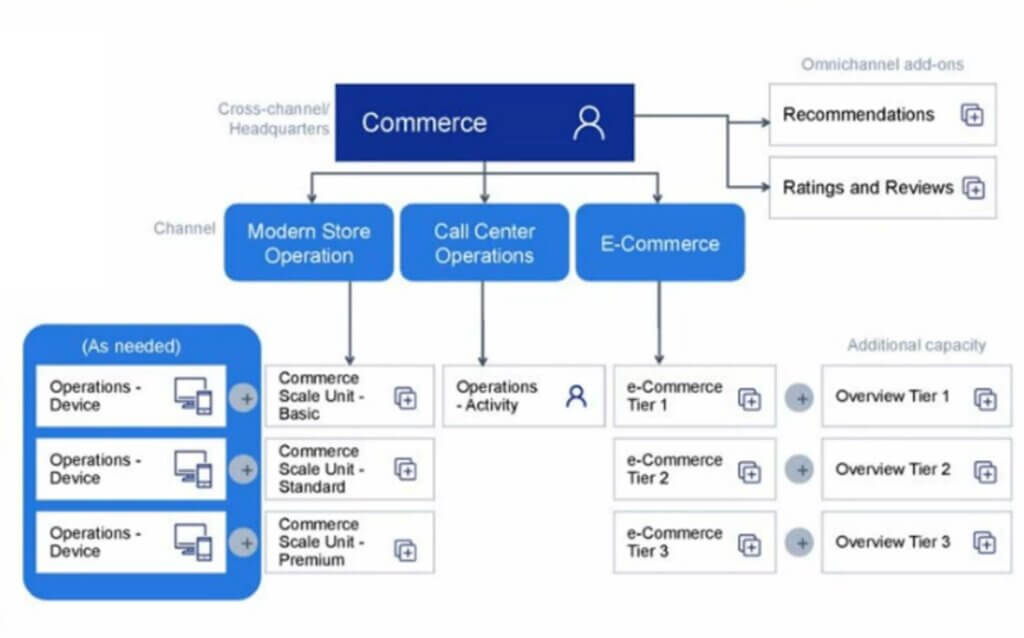
2. Dynamics 365 Finance
Formerly known as Dynamics 365 Finance and Operations, this application covers financial management, budgeting, financial reporting, and other core financial processes.
D365 Finance app enables medium sized organizations and enterprises to monitor the performance of global financial operations in real-time and predict future outcomes. As stated before, D365 ERP apps have a minimum requirement of 20 licenses.
This app is meant for employees in finance and accounting departments. The standard approach is to assign the Finance license to each accountant or financial controller. You will probably want to give access to other people within your environment as well, such as the CEO, CFO or budget contributors/clerks. However, you can assign them an Operations Activity license rather than the full Finance app.
3. Dynamics 365 Supply Chain Management
Also formerly known as and included in Dynamics 365 Finance and Operations, this application focuses on managing supply chain processes, inventory, production, and distribution.
D365 Supply Chain Management provides manufacturers, distributors and resellers with the real-time visibility and intelligence they need for proactive operations. Also, here you have a minimum requirement of 20 licenses.
The app has capacity for you to manage 100 of your physical assets. If you need capacity for more than 100 physical assets, you can purchase additional capacity separately.
Add-ons for Supply Chain Management
The Supply Chain Management app offers several add-ons, such as Asset Management Capacity, Sensor Data Intelligence and Cloud & Edge Scale Unit.
In the image below you can see what the Supply Chain Management app looks like from an operational viewpoint. You can add the different add-ons into your asset management and operate all your physical assets. I have not seen this application being widely used yet, however it could be that companies are already operating with it? Are you? Let us know!
Sensor Data Intelligence
If you have many assets within your organization, you have the option for unlimited Sensor Data Intelligence scenarios available. This is the case if you purchased one of these two licensing options: six Sensor Data Intelligence scenario add-ons or 10 Sensor Data Intelligence additional machine add-ons.
Sensor Data Intelligence is a set of capabilities enabling specific business processes. For instance, from the Licensing Guide, if you want to set up an item called Machine Down, this enables the manufacturing system to detect machine failures in your asset through IOT signals and generate an alert in the system.
Cloud & Edge Scale Unit
The Cloud & Edge Scale Unit extends your Supply Chain Management hub by adding dedicated processing. Capacity Scale Units can run in the cloud. Alternatively, they can run on the edge on premises or at your local facility.
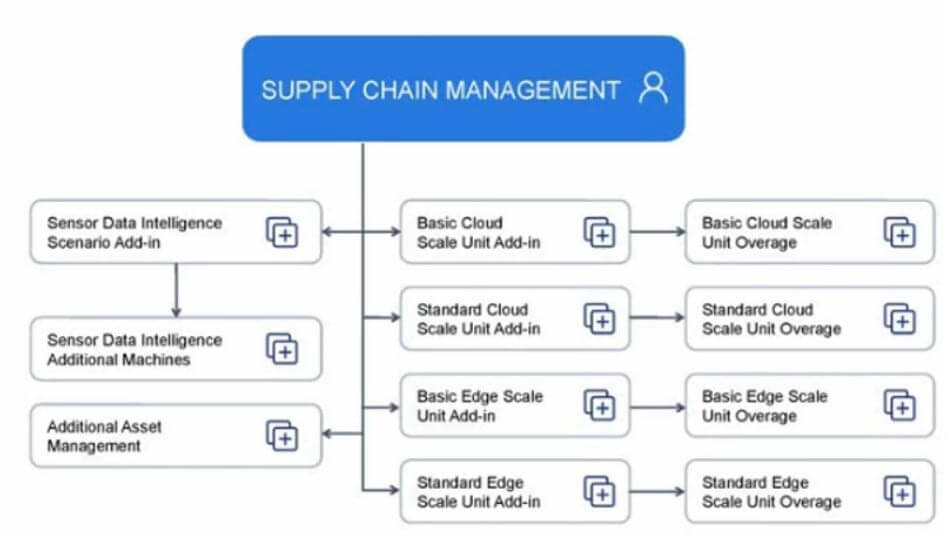
4. Dynamics 365 Human Resources
This application assists in managing HR functions, such as employee records, payroll, benefits, and performance management.
D365 Human resources is pretty straightforward. It enables organizations to optimize the following:
- Compensation
- Benefits
- Annual leave & Absence tracking
- Regulatory & Policy compliance
- Performance feedback
- Standardized training & Self-service programs
This application is meant for your HR professionals. Each HR professional should be given a Human Resource license. Other users outside your HR department, such as contractors, managers or employees, can be given a HR Self-Service license.
The HR Self-Service license is a very limited functional license, so it can also make sense to get Team Member licenses or Operations Activity license.
5. Dynamics 365 Project Operations
This application is only briefly discussed in the licensing guide. It is designed to help project-based businesses manage projects, resources, and financials in a unified manner. D 365 Project Operations connects sales, resourcing, project management and finance teams within a single product to help you win more deals, etc.
4. How to license Dynamics 365 applications
Licensing for Dynamics 365 varies based on the specific applications you choose and the licensing model you opt for. It can be somewhat complex due to the different needs and configurations that businesses may have.
Microsoft typically offers multiple licensing options, including both cloud-based subscriptions and on-premises licenses. Microsoft offers different licensing plans, which may include the options discussed below.
Per User Licensing
This is the base licensing type for Dynamics 365. This model licenses individual users and each user gets access to the specific application for which a license is acquired. This is divided into various application plans like the ones described above.
Each user who needs to access the application must have a dedicated license for that application. Microsoft sometimes provides different tiers of user licenses depending on the level of features and capabilities needed.
Base and Attach licenses
As a Dynamics 365 user you need to understand the difference between Base and Attach licenses.
Base licenses – The initial application you need for your users. You purchase a Base license to cover the usage of each user that needs access to the application.
Attach licenses – Stackable (cheaper) licenses that you add on top of the initial base license to unlock functionality for additional applications against a reduced price. You first purchase a base license for the required application and then you have the option to purchase Add-ons for any additional applications required by your users.
Attach licensing sounds difficult, but it quite easy to digest. First figure out what the base application is (usually the one you use the most) and then add the Attach licenses for the additional applications. Many combinations are available, and the Dynamics 365 Licensing Guide easily shows your options.
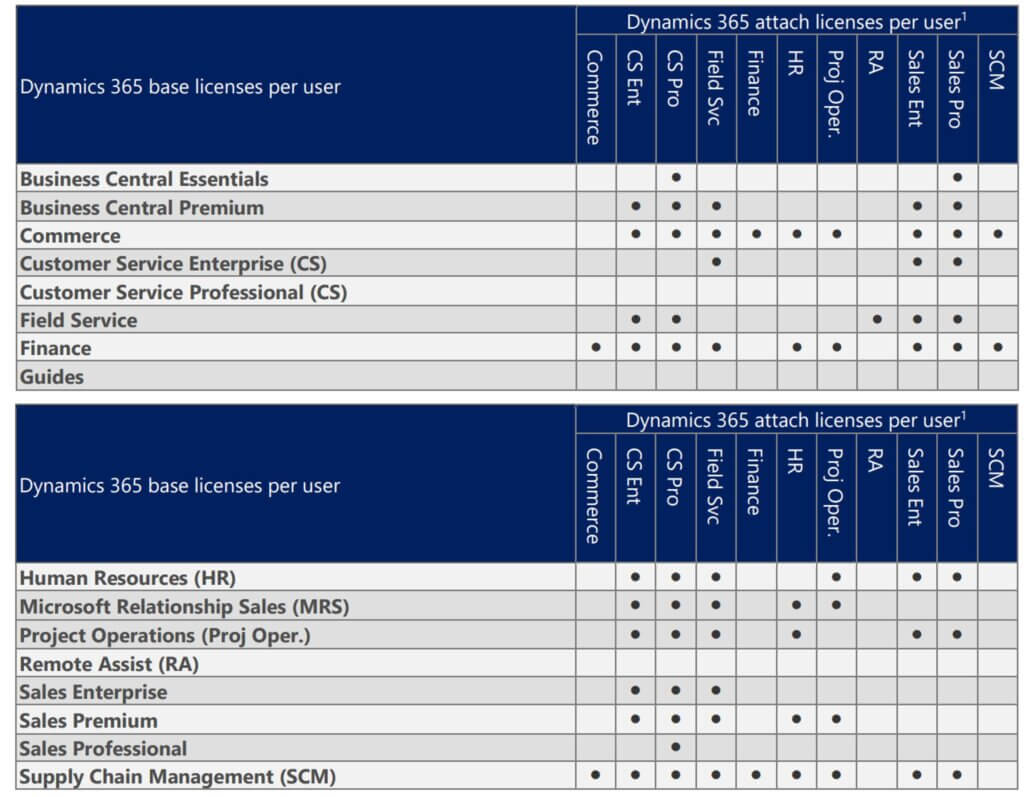
Team Member Licensing
This is a lighter version of licensing designed for users who need limited access to the system. Whereas a per User license for a single application grants you access to all that applications’ functionality, this license allows you to access multiple applications but with limited functionality. It is suitable for employees who require basic read access rights and light usage of the applications.
Device Licensing
This allows you to license devices that are shared among multiple users. Most application licenses offer a per Device option.
Add-on Licenses
Add-ons are available for additional functionalities or modules, such as extra automation capacity or additional portals that may require Add-on licenses. These are typically priced separately and can be added to your existing Dynamics 365 subscription.
Capacity Licenses
Some organizations may require higher capacity in terms of data storage, API requests, or other computational resources. In such cases, capacity licenses can be purchased to scale the system accordingly.
Bundled Licenses
Microsoft often offers bundles that include multiple Dynamics 365 applications at a discounted rate, such as the Premium Sales option. If you require more than just one application, this might be a cost-effective option.
Specialized Licenses
Depending on your specific needs, there may also be specialized licenses available, such as licenses for small businesses, nonprofits, or educational institutions.
Compliance and Terms
Make sure to carefully read the terms and conditions associated with the license, as there may be compliance requirements, limitations, or other important considerations.

5. Microsoft HoloLens
Microsoft HoloLens is an augmented reality (AR) technology that aims to enhance various aspects of Dynamics 365 suite of business applications, from remote assistance to training and development.
Hololens overlays digital information and holograms onto the physical world. By integrating augmented reality into the D365 suite, Microsoft aims to create a more interactive, efficient and effective environment for various business operations.
These are some of the ways in which HoloLens and Dynamics 365 are often used together:
- Dynamics 365 Remote Assist – enables remote collaboration with experts able to provide real-time guidance to workers in the field.
- Dynamics 365 Guides – step-by-step guidance overlaid on the real world for various tasks. Helpful in complex assembly lines, repair jobs or any situation needing precise instructions.
- Dynamics 365 Layout – Helps visualise room layouts in real physical space (likely to be discontinued).
- Dynamics 365 Product Visualize – Not directly a Hololens app, it aims to leverage AR tech for sales & marketing by enabling salespeople to showcase products in 3D format.
- Integrated Workflows – Seamless integration between AR experience & existing business workflows. For example, data collected through a Remote Assist session could automatically populate a customer service ticket in Dynamics 365 for Customer Service, or performance metrics from Dynamics 365 Guides could feed into employee training records in Dynamics 365 for Talent (now part of Dynamics 365 Human Resources).
Microsoft has developed specialized applications targeting business use-cases. Two other such applications are HoloLens Business Guides and HoloLens Business Remote Assist in CRM and Business Central in ERP.
All of these tools are built to integrate with Microsoft’s broader ecosystem of software and services, including Dynamics 365 and Microsoft Teams. This integration allows for a seamless workflow and enables companies to incorporate augmented reality into their existing IT infrastructure easily.
HoloLens Business Guides
Guides is an application for Microsoft HoloLens that aims to facilitate hands-free, step-by-step instruction for workers as they perform tasks.
By wearing the HoloLens headset, a worker can see digital overlays that provide real-time guidance, such as arrows pointing where to place an object or videos demonstrating a particular action.
The tool is especially useful for complex tasks or in situations where a worker is learning a new procedure.
Business Guides can be customized to fit a specific workflow, allowing businesses to optimize processes and train staff more effectively. It provides analytics for supervisors to monitor performance and identify areas for improvement. The application is often used in manufacturing, maintenance, and training scenarios, among others.
HoloLens Business Remote Assist
Remote Assist is another business-oriented application for the HoloLens that focuses on remote support and collaboration. The application allows a HoloLens user to establish a video call with a remote expert, who can then see what the HoloLens user sees in real-time.
The remote expert can provide guidance, draw annotations that appear in the HoloLens user’s field of view, and even share documents or schematics.
The tool is particularly useful for field service operations, maintenance tasks, or any situation where specialized knowledge is required but the expert cannot be physically present.
It allows for quicker problem resolution, minimizes downtime, and can significantly cut down on travel costs for specialized personnel.
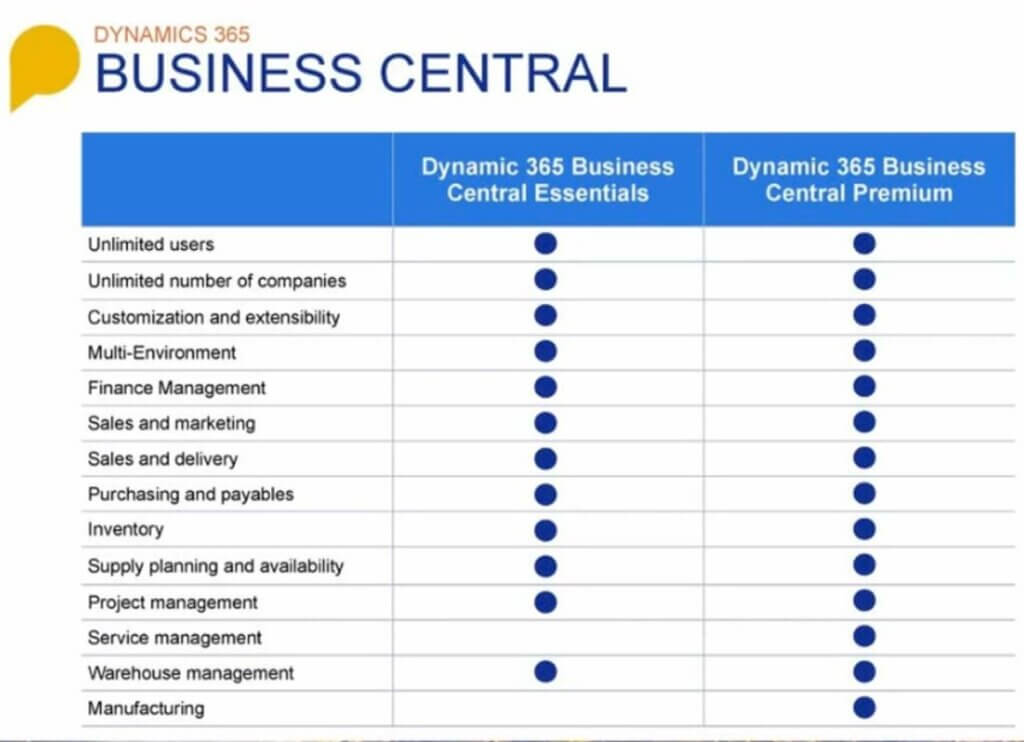
6. Business Central
Additional in the ERP package is Dynamics 365 Business Central, which is separate to all the other ERP products. It is a product in and of itself. Former Microsoft NAV users usually switch to Business Central.
Business Central is a license that is mainly available through CSP as it is heavily partner driven, but we hear it is also available in an Enterprise Agreement for customers who really want this, but this requires a concession from Microsoft.
What is Business Central?
Business Central is a comprehensive, all-in-one business management solution for small and medium-sized businesses. It covers aspects such as finance, sales, purchasing, inventory, and more. It connects teams across your businesses with tools to help them meet your business goals by:
- Working more efficiently
- Collaborating better
- Responding more quickly to changes
There are two versions: Essentials and Premium (see image above). It does not integrate with many other D365 offerings and is usually purchased through CSP. There are always exceptions, like purchasing it in the Enterprise Agreement.
The Essentials offer has almost the same functionality as Business Central Premium, aside from Service Management and something called Menu Factoring.
You can attach other applications like Customer Service Professional or Sales Professional.
Dynamics 365 licensing
This article aimed to provide a comprehensive overview of the different applications available in Dynamics 365 and information on how to license them. As you can see, it is a lot of information to take in as Dynamics 365 offers so many options.
Still unsure which applications are right for you? Do you have questions about licensing in D365? Reach out to our licensing experts at info@licenseq.com. You can also visit our Dynamics 365 Optimization page on the website to find out more about our services and how we can help you get the most out of D365!

